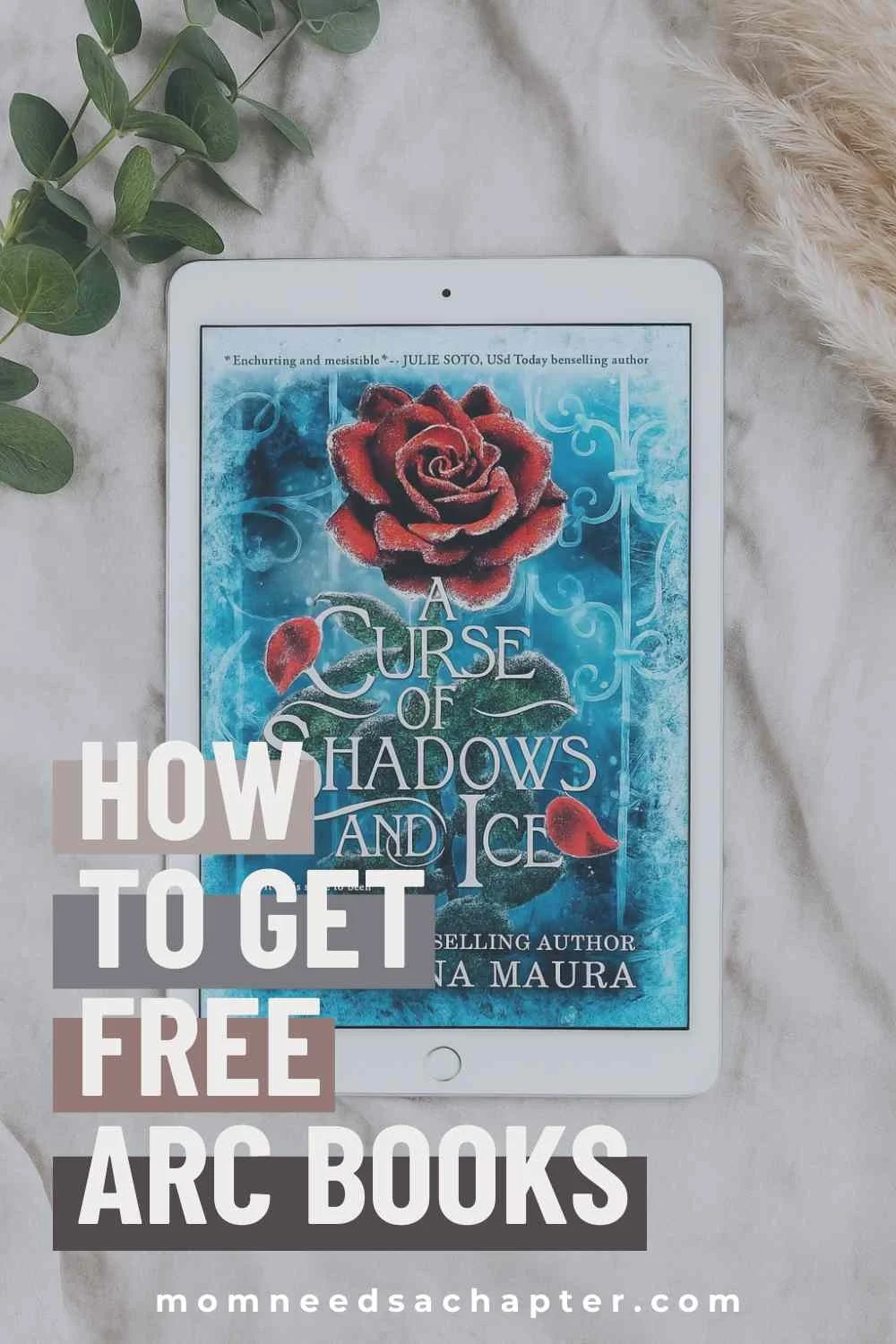How to Get Access to ARC Books the Easy Way
If you’ve ever scrolled through BookTok or Instagram and wondered how people get their hands on books before they’re released, you’re in the right place. Back when I worked at Borders Bookstore (RIP to a real one 🖤), publishers sent us advanced reader copies all the time—it felt like secret treasure showing up in the break room. But here’s the good news: you no longer have to work at a bookstore to get access to those free early reads. Getting ARCs is one of the most exciting perks of being a book-obsessed human, and it’s way easier to start than you might think. Whether you’re building your review platform or just want to devour new releases early, this guide walks you through exactly how to find, request, and review ARCs like a pro.
Disclosure: This blog post contains affiliate links. If you click through and make a purchase, I may earn a small commission at no additional cost to you. Thank you for supporting my work!
ARC FAQs
What does ARC mean in books?
ARC stands for Advance Reader Copy — a pre-release version of a book shared with reviewers to build buzz before publication.
Do you get paid to review ARCs?
No, ARCs are provided for free in exchange for an honest review — not payment.
Can anyone get free ARCs?
Yes! Anyone who reviews books regularly (on a blog, TikTok, Goodreads, etc.) can request ARCs from publishers or platforms like NetGalley.
Where can I find free eBook ARCs?
The easiest way to get started is through digital ARCs (also called eARCs). These are sent straight to your e-reader, which is great if you do most of your reading electronically (same here). Check NetGalley, Edelweiss+, BookSirens, or even indie author sign-up forms on TikTok and Facebook reader groups.
NetGalley
NetGalley is basically the holy grail of eARCs. Create a free account, fill out your reviewer profile (add your socials, Goodreads, or blog), and start requesting titles. Publishers will approve or decline based on how well you match the audience for that book — and your “feedback ratio” (aka how many of your requested books you’ve actually reviewed).
The majority of my ARCs come from NetGalley. It links to my Kindle app so it will send the eARCs directly to my device.
Edelweiss+
Similar to NetGalley, but a little more industry-facing. Some readers love it, others find it clunkier. It’s still worth signing up if you want to access books from publishers who don’t use NetGalley.
I’ve used Edelweiss+ before, but I wasn’t able to download the eARC to my device and had to read it using their in-browser reader—which felt a bit cumbersome. There’s probably a way to send it to your device, but I couldn’t figure it out at the time, and I haven’t tried it again since.
Pro tip: Start small. Request a few titles that genuinely interest you and that you know you can review before the publication date. Your approval rate will go way up if you actually follow through with reviews.
BookSirens
BookSirens is a free ARC platform that connects readers and reviewers with authors and publishers (especially indie ones). After creating a profile and selecting your favorite genres, you can browse available ARCs or get weekly email recommendations tailored to your tastes.
Unlike NetGalley, you can often download titles right away without waiting for approval, and it’s great for discovering new romance releases from smaller presses. Just be sure to post your review by the requested date to stay in good standing.
I haven’t tried it yet, but it’s been on my list.
What About Physical ARCs?
Most ARCs today are digital, but yes — it’s still possible to score those coveted real-book copies. It just takes a little more legwork.
You can:
Contact publishers directly. Most have publicity or marketing contact info on their websites. A polite email explaining who you are and where you review (blog, Instagram, TikTok, etc.) can go a long way.
Join mailing lists. Publisher newsletters sometimes offer ARC giveaways or review opportunities.
Attend book events. Book festivals, conventions, or local author signings often hand out physical ARCs to attendees.
ARC Request Email Template
Subject: ARC Request – [Book Title]
Hello [Publicist’s Name],
I hope this message finds you well. My name is [Your Name], and I [briefly describe your platform—e.g., “run a romance-focused book blog,” “share book reviews and recommendations on Instagram,” or “create BookTok content for fellow readers”].
I’m reaching out to request a physical advance copy of [Book Title by Author Name] (publishing [date]) for potential review and feature on my [blog / social platforms / newsletter / etc.]. My audience includes [X number] of [followers/readers/subscribers], primarily [genre or niche, e.g., “romance and fantasy readers”]. I also share reviews on Goodreads and Amazon after publication.
If physical ARCs are available, I’d be happy to provide my mailing address upon approval.
Thank you for your time and consideration. I’d love the opportunity to help promote this upcoming release.
Warm regards,
[Your Name]
[Your Blog or Platform Name, if applicable]
[Website or Linktree] | [Social Handle(s)] | Goodreads: [Profile Link]
ARC Request Email Template (for New Reviewers)
If you are new to social platforms and don’t have a lot of followers, you can use this simpler email template:
Subject: ARC Request – [Book Title]
Hello [Publicist’s Name],
I hope you’re doing well. My name is [Your Name], and I’m an avid reader who loves sharing honest book reviews and recommendations with other readers on [Goodreads / Instagram / TikTok / etc.].
I’d love to request a physical advance copy of [Book Title by Author Name] (publishing [date]) for review and feature on my [blog / social media / Goodreads profile]. I regularly post thoughtful reviews and enjoy helping spread the word about upcoming releases.
If physical copies are available, I’d be happy to provide my mailing address upon approval.
Thank you for your time and consideration — I truly appreciate the opportunity to support new titles and share them with my reading community.
Warm regards,
[Your Name]
[Preferred Platform or Handle] | Goodreads: [Profile Link]
Be Realistic: Don’t Request More Than You Can Read
It’s easy to get ARC-happy and click “Request” on everything. But remember — those requests are commitments. Publishers pay attention to how often reviewers follow through.
A few friendly reminders:
Only request a few ARCs at a time.
Make sure you have enough time to read and review before the publication date.
Not every request will be approved — and that’s okay! Everyone gets declined sometimes (me too!).
Disclosure Etiquette
According to FTC guidelines, reviewers should disclose when they received a free copy in exchange for an honest review. That said, a few reviewers have had Amazon remove reviews if they explicitly mention “free ARC” or “received from publisher.” To be safe, try a softer disclosure like:
“I received an advance copy and voluntarily left this review.”
It keeps things transparent without triggering Amazon’s filters.
What If You Didn’t Like the Book?
It happens — not every book will hit the mark.
If you didn’t love it (or couldn’t finish it), be honest but kind. You can still provide value without being harsh:
Mention what didn’t work for you and why, without attacking the author or readers who might enjoy it.
Don’t tag the author in a negative review.
If it’s an indie author and you spotted typos or formatting issues, you can reach out privately — ARCs are not final published copies so errors are expected.
Remember, your review helps both authors and readers. Be honest, but keep your feedback thoughtful.
Building Your Bookish Influence
Publishers are more likely to approve your requests if they see you have an engaged presence — but that doesn’t mean you need a huge following. Consistency, authenticity, and a clear niche go a long way.
On Instagram (Bookstagram)
Post regularly (a few times a week).
Use relevant hashtags: #Bookstagram #RomanceReader #ARCReview #BookBlogger.
Engage with others — comments, shares, and collabs build community.
On TikTok (BookTok)
Keep videos short and real — think “5 Romance ARCs I Loved” or “Books I Couldn’t Put Down.”
Use trending sounds, but make it you.
Respond to comments and engage with other creators.
On Your Blog or Podcast
If you have a blog or podcast, that’s a huge bonus. Publishers love seeing multi-platform reviewers.
Be ready to share your stats — like average monthly readers or follower count when requesting ARCs. Even if your numbers are small, show that you have a loyal, engaged audience who trust your taste.
And let’s be real — I’m still building my own following, too. It’s a process! The key is consistency and genuine enthusiasm for the books you share.
Finding Indie Author ARCs & Street Teams
Some of the best stories I’ve found came from indie authors offering ARCs on TikTok, Instagram, or in Facebook reader groups. Follow your favorite indie authors — they often post sign-up forms for ARC readers or “street teams.”
What’s a Street Team?
A street team is a group of readers who get early access to a book and help promote it leading up to release. Here’s how it differs from a regular ARC:
You still read and review the book.
You’ll also help promote it — share posts, quotes, graphics, or countdowns.
It’s more community-oriented and often comes with fun perks (like exclusive swag, sneak peeks, or early access to future books).
If you love connecting with authors and hyping up books you enjoy, joining a street team can be incredibly rewarding.
Final Thoughts
Getting ARCs isn’t as mysterious as it seems — it’s all about being consistent, respectful, and a little strategic.
Start with NetGalley, explore Edelweiss if you’re curious, and don’t hesitate to reach out to publishers or indie authors directly. Build your online presence, review thoughtfully, and always keep kindness front and center.
And most importantly? Keep it fun. Because nothing beats that feeling of being one of the first to fall in love with a story before the rest of the world does.
Want more ARC opportunities and bookish insider tips? Subscribe to my newsletter for updates on upcoming romance releases and ARC lists!






